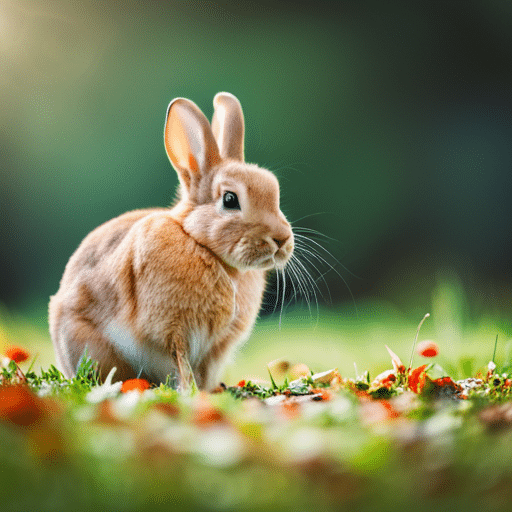Are you curious about the secret lives of rabbits? Wondering about the lifespan of these adorable creatures? Look no further! In this captivating article, we will delve into the fascinating world of rabbits and unravel the mystery of their lifespan. Rabbits have been cherished pets for centuries, captivating us with their soft fur, twitching noses, and playful antics. But how long do these furry friends actually live? The answer to this question depends on many factors, including the breed, diet, and environment of the rabbit. On average, a healthy domestic rabbit can live anywhere from 8 to 12 years with proper care. However, certain breeds have been known to live much longer than that! Prepare to be amazed as we explore the factors that influence a rabbit’s lifespan, from genetics and diet to living conditions and veterinary care. Discover the surprising secrets behind their longevity and learn how you can ensure your own rabbit lives a happy and healthy life. Whether you’re a new rabbit owner or a long-time enthusiast, this article is sure to provide you with valuable insights into the enigmatic world of our beloved furry companions. Get ready to embark on a journey of discovery as we unravel the mystery of how long rabbits really live!
Factors that Affect Rabbit Lifespan

Rabbits, like any other living beings, have certain factors that can influence their lifespan. Genetics, diet, living conditions, and veterinary care all play a crucial role in determining how long a rabbit can live. Let’s take a closer look at each of these factors.
Genetics can have a significant impact on a rabbit’s lifespan. Some breeds of rabbits are naturally predisposed to live longer than others. For example, the Netherland Dwarf breed tends to have a shorter lifespan of about 5 to 7 years, while larger breeds like the Flemish and Giant breeds can live up to 10 years or more. It’s important to consider the breed’s average lifespan when deciding to bring a rabbit into your life.
Diet is another crucial factor in a rabbit’s longevity. These herbivores have very specific diet and dietary requirements that must be met to ensure their overall health and well-being. A balanced diet rich in hay, fresh vegetables, and a limited amount of rabbit pellets, is essential for a rabbit’s longevity. A poor diet can lead to various health issues and ultimately shorten their lifespan.
Living conditions also play a vital role in a rabbit’s lifespan. Rabbits are highly social animals that thrive in a stimulating environment. They need enough space to exercise and explore, as well as safe hiding spots to retreat to when they feel threatened. A well-maintained and spacious living area can contribute to a rabbit’s overall happiness and longevity.
Regular veterinary care is crucial to ensure a rabbit’s good health and longevity. Routine check-ups, vaccinations, and preventive care can help detect and address any health issues before they become more severe. It is recommended to find a veterinarian who specializes in rabbit care to provide the best possible medical attention for your furry friend.
Average Lifespan of Different Rabbit Breeds
Rabbits come in various breeds, each with its own unique characteristics and average lifespan. While individual rabbits may live longer or shorter than their breed’s average lifespan, it’s helpful to have a general understanding of the longevity of different breeds.
The Netherland Dwarf breed senior rabbits, known for its small size and adorable appearance, has an average lifespan of about 5 to 7 years. On the other hand, the Lionhead breed of dwarf breeds, with its distinctive mane-like fur, can live up to 7 to 10 years. The Flemish Giant, the largest breed of rabbit, has an average lifespan of around 8 to 12 years, making it one of the longest-living rabbit breeds.
It’s important to remember that these are just averages, and individual rabbits may live longer or shorter lives depending on various factors. Providing proper care and attention to your rabbit can greatly contribute to its overall lifespan.
Longest Living Rabbits in History

While the average lifespan of rabbits may be known, some exceptional cases have amazed us with their longevity. Let’s take a look at some of the longest-living rabbits in history.
One remarkable rabbit, Flopsy, holds the Guinness World Record for being the oldest rabbit ever recorded. Flopsy lived a whopping 18 years and 10 months, surpassing the average lifespan by a significant margin. Flopsy’s long life span can be attributed to exceptional care, a balanced diet, and regular veterinary check-ups.
Another extraordinary case is Bramble, a female rabbit who lived to be 16 years old. Bramble’s longevity was attributed to her pet owner who’s dedication to providing a stimulating environment and a well-balanced diet. She became somewhat of a celebrity in the rabbit community and inspired many pet rabbit owners to prioritize their pets’ well-being.
These exceptional cases remind us that with proper care and attention, rabbits can live well beyond their expected lifespan. It’s a testament to the bond between humans and animals and the impact we can have on their lives.
Tips for Increasing Your Rabbit’s Lifespan
While genetics and breed play a significant role in a rabbit’s lifespan, there are several steps you can take to ensure your furry friend lives a long and healthy life. Here are some tips to increase your rabbit’s lifespan:
1. Provide a balanced diet: A proper diet is crucial for a rabbit’s overall health and longevity. Ensure they have access to fresh hay, a variety of leafy greens, and a limited amount of pellets. Avoid feeding them foods that are harmful to their digestive system, such as chocolate, avocado, and onions.
2. Encourage exercise: Rabbits are active animals that require regular exercise to maintain their physical and mental well-being. Provide them with enough space to hop, run, and explore. You can also set up obstacle courses or provide toys to keep them engaged and active.
3. Maintain a clean living environment: Regularly clean your rabbit’s living area to prevent the buildup of waste and bacteria. Provide fresh bedding, and ensure the area is well-ventilated. A clean and hygienic environment can help prevent the onset of various health issues.
4. Socialize and stimulate: Rabbits are social creatures that thrive on companionship and mental stimulation. Spend quality time with your rabbit, socialize them with other rabbits if possible, and provide toys and enrichment activities to keep them engaged and entertained.
5. Regular veterinary check-ups: Schedule routine check-ups with a local vet or a veterinarian who specializes in rabbit care. Regular vaccinations, dental exams, and overall health assessments can help detect any potential health issues early on and ensure your rabbit receives the necessary treatment.
By following these tips and providing your rabbit with the love and care they deserve, you can help your happy rabbit increase their lifespan and enjoy many happy years together.
Common Health Issues That Can Affect Rabbit Lifespan
Like any living being, rabbits are susceptible to various health issues that can impact their lifespan. Being aware of these common health issues can help you take preventive measures and provide timely care when needed. Here are some other health problems and conditions that can affect a rabbit’s lifespan:
1. Dental problems: Rabbits have continuously growing teeth, and if not properly worn down, it can lead to dental issues such as overgrown teeth, abscesses, and dental malocclusion. Regular dental exams and providing appropriate chew toys can help prevent these problems.
2. Gastrointestinal stasis: Gastrointestinal stasis, also known as a “slow gut,” is a common condition in rabbits. It occurs when the digestive system slows down, leading to a decrease in appetite and potentially life-threatening complications. A balanced diet, regular exercise, and access to fresh hay can help prevent this condition.
3. Respiratory issues: Rabbits can suffer from respiratory infections, often caused by bacteria or viruses. These infections can lead to breathing difficulties and other complications. Maintaining a clean living environment and avoiding exposure to cigarette smoke or other respiratory irritants can help prevent these issues.
4. Obesity: Obesity is a growing concern in pet rabbits and can significantly impact their overall health and lifespan. Overfeeding and a lack of exercise contribute to weight gain. Providing a balanced diet and encouraging regular exercise is essential in preventing obesity.
5. Urinary tract issues: Rabbits can develop urinary tract problems, including bladder stones and urinary sludge. These conditions can cause pain and discomfort and may require medical intervention. A diet rich in hay and fresh water can help prevent urinary tract issues.
Being aware of these common health issues and taking proactive measures to prevent them can greatly contribute to your rabbit’s well-being and longevity.
Proper Nutrition and Care for a Long-Lived Rabbit

Proper rabbit nutrition and care are essential for ensuring your rabbit lives a long and healthy life. Here are some key considerations for providing your furry friend with the best possible care:
1. Diet: A rabbit’s diet should primarily consist of fresh grass hay only, which aids in digestion and wears down their teeth. Offer a variety of leafy greens such as kale, spinach, and romaine lettuce. Pellets should be limited to a small portion to avoid obesity. Fresh water should always be available.
2. Exercise: Rabbits need regular exercise to maintain their physical and mental well-being. Provide ample space for them to hop, run, and explore. You can also set up tunnels, toys, and other stimulating objects to keep them active.
3. Grooming: Regular grooming is essential to keep your rabbit’s coat clean and free from mats. Brush their fur to remove loose hair and prevent hairballs. Long-haired breeds may require more frequent grooming to prevent tangles and matting.
4. Socialization: Rabbits are social animals that thrive on companionship. If possible, consider having more than one rabbit to keep them company. If you have a single rabbit, ensure you spend quality time interacting with them daily to provide social stimulation.
5. Environmental enrichment: Provide a stimulating environment for your rabbit by offering toys, tunnels, and hiding spots. You can even create a digging box filled with safe materials for them to explore. Regularly rotate toys and change the layout of their living area to keep things interesting.
6. Veterinary care: Schedule regular check-ups with a veterinarian who specializes in rabbit care. This will ensure your rabbit receives necessary vaccinations, dental exams, and overall health assessments. Early detection and treatment of any health issues can significantly impact a rabbit’s life and lifespan.
By following these guidelines and providing your rabbit with a balanced diet, regular exercise, and proper veterinary care, you can help ensure they live a long and happy life.
Signs of Aging in Rabbits
As rabbits age, certain physical and behavioral changes may occur. Recognizing these signs of aging can help you provide the appropriate care and support for your rabbit. Here are some common signs of aging in rabbits:
1. Decreased activity: Older rabbits may become less active and spend more time resting. They may also show a reduced interest in toys and other stimulating activities.
2. Changes in appetite: Aging rabbits may show a decreased appetite or be more selective about their food choices. It’s important to monitor their eating habits and ensure they are still consuming an appropriate amount of food.
3. Weight loss: As rabbits age, they may experience weight loss due to a decrease in muscle mass or changes in their metabolism. Regularly weigh your rabbit to monitor any significant weight changes.
4. Dental issues: Older rabbits are more prone to dental problems such as overgrown teeth or dental malocclusion. Regular dental check-ups are crucial to detect and address these issues early on.
5. Changes in fur and skin: Aging rabbits may experience changes in their fur, such as graying or thinning. They may also develop skin conditions or lumps. Regularly inspect your rabbit’s skin and fur for any abnormalities.
6. Behavioral changes: Older rabbits may display changes in their behavior, such as increased aggression or a decrease in social interaction. These changes in adult rabbits may be due to age-related factors or underlying health issues.
If you notice any significant changes in your rabbit’s behavior or physical condition, it’s important to consult with a veterinarian who specializes in rabbit care. Early detection and appropriate treatment can greatly improve their quality of life as they age.
How to Create a Comfortable and Stimulating Environment for Your Rabbit
Creating a comfortable and stimulating environment is crucial for your rabbit’s overall well-being and longevity. Here are some tips to ensure your furry friend has the best possible living environment:
1. Provide ample space: Rabbits need enough space to hop, run, and explore. A rabbit’s living area should be large enough to accommodate its size and allow for exercise. Consider setting up a playpen or using baby gates to create a safe and spacious area for them to roam.
2. Ensure safety: Rabbit-proof your home to prevent any potential hazards. Remove toxic plants, secure electrical cords, and block access to small spaces where your rabbit could get stuck. Providing a safe environment will minimize the risk of accidents or injuries.
3. Create hiding spots: Rabbits are prey animals and need safe hiding spots to feel secure. Provide tunnels, boxes, or other structures where they can retreat when they feel threatened or overwhelmed. These hiding spots will help reduce stress and anxiety.
4. Offer toys and enrichment activities: Keep your rabbit mentally stimulated by providing toys and enrichment activities. Offer puzzle toys, tunnels, chew toys, and objects they can toss and play with. Rotate toys regularly to keep their environment interesting.
5. Provide a comfortable resting area: Rabbits need a cozy and comfortable place to rest. Offer a soft bedding material, such as hay or straw, in their sleeping area. Ensure the bedding is clean and changed regularly to maintain good hygiene.
6. Socialize and interact: Rabbits are social animals that thrive on companionship. If possible, consider having more than one rabbit to provide social interaction. If you have a single rabbit, ensure you spend dedicated time interacting and bonding with them daily.
By creating a comfortable and stimulating environment for your pet rabbit, you can promote their overall well-being and ensure they live a happy and fulfilling life.
Frequently Asked Questions
How long do rabbits live as a pet?
On average, rabbits can live between 8-12 years as a pet. Rabbits can even live up to 15 years with proper care and nutrition.
Can rabbits live 20 years?
It is possible for rabbits to live up to 20 years with proper care and nutrition. However, most domestic rabbits will live between 8-12 years on average.
What age do rabbits become elderly?
Rabbits can enter their senior years around 7-8 years of age. As they age, certain physical and behavioral changes may occur, such as decreased activity or a reduction in appetite. Ensure you monitor these changes and consult with a veterinarian who specializes in rabbit care if necessary.
How long do outdoor rabbits live?
The lifespan of an outdoor rabbit can vary depending on the environment and its access to food and shelter. On average, they typically live shorter lives due to increased exposure to predators or adverse weather conditions. With proper care and protection, outdoor rabbits can have a lifespan similar to that of indoor rabbits. By providing an appropriate diet, regular exercise, veterinary care, and a comfortable living environment, you can help ensure your rabbit lives a long and happy life.
who lives longer female rabbit or a male rabbit?
It is not possible to determine definitively which gender of rabbit will live longer because it depends on many factors such as health, diet, and living environment. However, some studies have found that female rabbits outlive males on average. Therefore, it may be beneficial to consider getting a female rabbit if you are looking for one with a longer lifespan.
Conclusion
Rabbits are fascinating creatures that bring joy and companionship into our lives. Understanding the factors that influence their lifespan, such as genetics, diet, living conditions, and veterinary care, is essential for providing them with the best possible care.
By following proper nutrition guidelines, providing ample exercise and mental stimulation, and prioritizing regular veterinary check-ups, you can increase your rabbit’s lifespan and ensure they live a long and healthy life.
Remember, each rabbit is unique, and their lifespan may vary. By being attentive and proactive in their care, you can enjoy many wonderful years with your beloved furry companion. So, embrace the mystery of how long rabbits really live and embark on a journey of discovery with these enchanting creatures.



